10. Revell
 ing/Reckoning (2001) - Ani DiFranco
ing/Reckoning (2001) - Ani DiFranco Ani DiFranco could very well be the most talented musical artist of this generation, and on the double album Revelling/Reckoning she shows the full range of her abilities as a writer, singer, and musician. It's one of her more subtle works; most of the songs simply feature Ani on her guitar in a room, and it feels very personal. While some of her early work didn't do justice to her talent due to poor recording quality, that is no issue here. It's a well produced, epic work of quiet poetic beauty.
9. Sound of Silver (2007) - LCD Soundsystem

The sophomore effort from LCD Soundsystem simply rocks. Heavily influenced by electronic music, this organic, rich album strikes the perfect groove. It's primarily a dance album, but it's filled with such personal emotion, raising it to a higher level.
8. One W
 ord Extinguisher (2003) - Prefuse 73
ord Extinguisher (2003) - Prefuse 73Listening to this insane album is kind of like falling down Alice's rabbit hole, and while that reference is cliched, this album is an original work of art, a breath of fresh air. Mostly an instrumental hip-hop album, Extinguisher takes so many twists and turns that you find yourself spellbound by the sheer skill of Scott Herren, the real name behind one of his many aliases.
7. Simple Things (2002) - Zero 7

This has become one of my mainstays, always good for those occasions when you just need to relax with some quality atmospheric music. The great thing about Simple Things is that it works well as background music just as well as it works as intricate, smart music. The cool grooves wash over you, and the guest vocal performances are fantastic throughout.
6. Vespertine
 (2001) - Bjork
(2001) - BjorkBjork, known to most of America as 'that girl who wore the swan dress,' has been one of the most unique and talented artists of the last 20 years. While labeled as 'Pop,' she is constantly searching for new forms of musical self expression and artistry, which is often lacking in the genre. Vespertine is no exception, and it's arguably her best album. Each song flows into the next as kind of an extended musical poem.

5. Funeral (2004) - The Arcade Fire
While their second album, Neon Bible, might actually be just as good, ultimately this bold debut is my choice for this list. The talented ensemble created a beautiful piece of real, true, honest music, and it will likely go down as a classic. It's emotional, dynamic, and endlessly replayable.
4. The Rem
 inder (2007) - Feist
inder (2007) - FeistI've once heard Feist's voice described as an instrument that only she knows how to play, and I couldn't agree more. The Reminder is a very simple album musically speaking, and with the sheer piercing quality of her voice she transforms it into something magical, putting other female pop artists like Britney Spears, Lady Gaga, and even Christina Aguilera to utter shame.
3. Merriweather Post Pavilion (2009) - Animal Collective

Animal Collective has released 8 LPs and a couple EPs over the last decade, making them one of the most active groups out there, possibly because they are never satisfied with where they are. AC is constantly redefining the limits of pop music, their music simultaneously accessible and bizarre. Their most recent full length album, Merriweather Post Pavilion, named in honor of the musical venue in my hometown of Columbia, Maryland, is their best effort to date, showing the group at the peak of their ability. It weaves catchy melodies with danceable beats and introspective lyrics, creating an all-encompassing, full-sensory experience.
2. Kid A (2000) - Radiohead
By the ti
 me Thom Yorke and Co. decide to call it a career, Radiohead will likely go down as the greatest rock band of all time. They are unmatched in their sense of artistic integrity, as their success has driven them to break new ground rather than to rehash the same material that made them famous. They followed up their groundbreaking classic OK Computer, with Kid A, a dark concept album, almost entirely devoid of all the conventions of rock music. Radiohead had made their name on guitar driven rock, and they followed up a universally acclaimed classic with an album where you can barely distinguish a guitar throughout most of the album. This gutsy move paid off big time, proving that Radiohead is a band that will continue to evolve and develop new sounds, and take on political topics with abstract art music.
me Thom Yorke and Co. decide to call it a career, Radiohead will likely go down as the greatest rock band of all time. They are unmatched in their sense of artistic integrity, as their success has driven them to break new ground rather than to rehash the same material that made them famous. They followed up their groundbreaking classic OK Computer, with Kid A, a dark concept album, almost entirely devoid of all the conventions of rock music. Radiohead had made their name on guitar driven rock, and they followed up a universally acclaimed classic with an album where you can barely distinguish a guitar throughout most of the album. This gutsy move paid off big time, proving that Radiohead is a band that will continue to evolve and develop new sounds, and take on political topics with abstract art music.1. Frances The Mute (2005) - The Mars Volta
Easily the best album of the decade, Frances The Mute deserves a mention in the con
 versation of the greatest albums of all time. After the promising band At The Drive-In broke up, The Mars Volta rose from the ashes as a progressive rock band for the new millennium. This magnum opus incorporates elements of latin music, jazz, progressive rock, and lyrics that jump from English to Spanish. Most of the tracks are well over the standard 4 minute length, and they flow into each other seamlessly. The album could be considered one coherent piece of music rather than simply an assortment of songs, and the final 30 minutes reaches almost unobtainable heights. This is essential listening for anyone who cares about good music.
versation of the greatest albums of all time. After the promising band At The Drive-In broke up, The Mars Volta rose from the ashes as a progressive rock band for the new millennium. This magnum opus incorporates elements of latin music, jazz, progressive rock, and lyrics that jump from English to Spanish. Most of the tracks are well over the standard 4 minute length, and they flow into each other seamlessly. The album could be considered one coherent piece of music rather than simply an assortment of songs, and the final 30 minutes reaches almost unobtainable heights. This is essential listening for anyone who cares about good music.The next 5...
The Black Parade - My Chemical Romance
The College Dropout - Kanye West
Haunted - Poe
Year Zero - Nine Inch Nails
Give Up - The Postal Service






 Office Space was a flop at the box office upon its release in 1999, grossing a mere $10 million, which barely covered the cost of producing the film. Since then it has become a huge cult hit on DVD, selling almost 6 million copies. It was a skewering satire of the corporate American workplace and the futility of the daily grind the American worker puts themselves through in order to make money just so they can afford a house that's left vacant all day and a car to take them back and forth from work. While the white collar crime aspect of the plot might have been fun comedy on the surface, it demonstrated the emotional desperation and frustration of the office worker that comes with sitting in the same cubicle every day, doing meaningless, unfulfilling work, and going home to get a few hours of sleep only to wake up and sit through traffic on your way to doing a job you hate. It was a film so many could identify with, and that's why it's still an enduring favorite in home theaters 10 years after its release.
Office Space was a flop at the box office upon its release in 1999, grossing a mere $10 million, which barely covered the cost of producing the film. Since then it has become a huge cult hit on DVD, selling almost 6 million copies. It was a skewering satire of the corporate American workplace and the futility of the daily grind the American worker puts themselves through in order to make money just so they can afford a house that's left vacant all day and a car to take them back and forth from work. While the white collar crime aspect of the plot might have been fun comedy on the surface, it demonstrated the emotional desperation and frustration of the office worker that comes with sitting in the same cubicle every day, doing meaningless, unfulfilling work, and going home to get a few hours of sleep only to wake up and sit through traffic on your way to doing a job you hate. It was a film so many could identify with, and that's why it's still an enduring favorite in home theaters 10 years after its release. Social commentary is Mike Judge's forte, and he's back at it again, this time using blue collar work as the backdrop for Extract. However, unlike Office Space, Judge doesn't seem to be out to satirize the fundamental nature of this workplace. He seems to have much more respect for the manual labor needed to create a real product than the mindless paper-pushing of the office. Jason Bateman plays his standard everyman role as the owner of a company that produces various extract flavors. He proudly built the company from the ground up but his non-existent sex life at home is causing him to go through a mid-life crisis of sorts. He plans to sell the company to a large corporation so he can retire, but an accident on the floor injures a worker and puts the deal on hold.
Social commentary is Mike Judge's forte, and he's back at it again, this time using blue collar work as the backdrop for Extract. However, unlike Office Space, Judge doesn't seem to be out to satirize the fundamental nature of this workplace. He seems to have much more respect for the manual labor needed to create a real product than the mindless paper-pushing of the office. Jason Bateman plays his standard everyman role as the owner of a company that produces various extract flavors. He proudly built the company from the ground up but his non-existent sex life at home is causing him to go through a mid-life crisis of sorts. He plans to sell the company to a large corporation so he can retire, but an accident on the floor injures a worker and puts the deal on hold.
 It is fitting that Ang Lee's new film Taking Woodstock is being released now as we pause to look back at those "3 days of peace & music." It tells the story of how the greatest music festival of all time came to be and shows the impact it had on the local families, their community and the world. It was called "Woodstock" because it was supposed to take place in Woodstock, NY as a much smaller event. As the project grew the location was changed to the town of Wallkill, NY, but when the local government of Wallkill banned the festival the promoters began to look for yet another location. Elliot Teichberg, the central character of the film, saw a newspaper article about the festival being banned in Wallkill, and, having already acquired a permit for an outdoor music festival, contacted Woodstock Ventures and offered to host the event in Bethel, NY.
It is fitting that Ang Lee's new film Taking Woodstock is being released now as we pause to look back at those "3 days of peace & music." It tells the story of how the greatest music festival of all time came to be and shows the impact it had on the local families, their community and the world. It was called "Woodstock" because it was supposed to take place in Woodstock, NY as a much smaller event. As the project grew the location was changed to the town of Wallkill, NY, but when the local government of Wallkill banned the festival the promoters began to look for yet another location. Elliot Teichberg, the central character of the film, saw a newspaper article about the festival being banned in Wallkill, and, having already acquired a permit for an outdoor music festival, contacted Woodstock Ventures and offered to host the event in Bethel, NY. Having been originally designed as a for-profit investment, Elliot's family motel is granted exclusive rights to distribute passes to the event, and a few people begin to straggle in looking to score the "magic tickets" while construction crews begin to build the stage and prepare for the concert. But soon the town is overwhelmed by a flood of hippies after word accidentally gets out that it was a free concert featuring Janis Joplin, Jimi Hendrix, The Who, Creedence Clearwater Revival, and many others. Having little time to prepare, the organizers cut the fence and acknowledged they would take a huge financial hit as they had no way to sell or collect tickets for the mass of humanity that was arriving in greater numbers by the day. The result, while unlikely, was magical.
Having been originally designed as a for-profit investment, Elliot's family motel is granted exclusive rights to distribute passes to the event, and a few people begin to straggle in looking to score the "magic tickets" while construction crews begin to build the stage and prepare for the concert. But soon the town is overwhelmed by a flood of hippies after word accidentally gets out that it was a free concert featuring Janis Joplin, Jimi Hendrix, The Who, Creedence Clearwater Revival, and many others. Having little time to prepare, the organizers cut the fence and acknowledged they would take a huge financial hit as they had no way to sell or collect tickets for the mass of humanity that was arriving in greater numbers by the day. The result, while unlikely, was magical.

 We've all seen plenty of "Rom-Coms" and by now we all know the formula by heart. Boy meets girl, they hit it off at first, then there's a big misunderstanding and the relationship goes in the tank, each principal character hangs out with their friends to go over what went wrong and figure out how to move on with the rest of their lives, and then the rest of the film is a big build up to the couple getting back together in the end. It's been done countless times, and yet, for some reason, people keep paying to see the same movie played out with different actors in different settings over and over again. Why?
We've all seen plenty of "Rom-Coms" and by now we all know the formula by heart. Boy meets girl, they hit it off at first, then there's a big misunderstanding and the relationship goes in the tank, each principal character hangs out with their friends to go over what went wrong and figure out how to move on with the rest of their lives, and then the rest of the film is a big build up to the couple getting back together in the end. It's been done countless times, and yet, for some reason, people keep paying to see the same movie played out with different actors in different settings over and over again. Why? Hopefully, (500) Days of Summer will help show some people what they've been missing. It only makes sense because love is emotional. It's not always neat and pretty and, in fact, often relationships are downright messy and difficult. Perhaps that's why the opening narration of (500) Days warns the audience that "this is not a love story." In fact, it's the story of a young man named Tom (Gordon-Levitt) who works as a writer for a greeting card company. He's grown up believing that he will never be fulfilled as a person until he meets "the one" special girl he's destined to spend his life with. Enter Summer (Deschanel), the new girl in the office. Tom falls for her at first sight and believes his destiny has finally found him.
Hopefully, (500) Days of Summer will help show some people what they've been missing. It only makes sense because love is emotional. It's not always neat and pretty and, in fact, often relationships are downright messy and difficult. Perhaps that's why the opening narration of (500) Days warns the audience that "this is not a love story." In fact, it's the story of a young man named Tom (Gordon-Levitt) who works as a writer for a greeting card company. He's grown up believing that he will never be fulfilled as a person until he meets "the one" special girl he's destined to spend his life with. Enter Summer (Deschanel), the new girl in the office. Tom falls for her at first sight and believes his destiny has finally found him.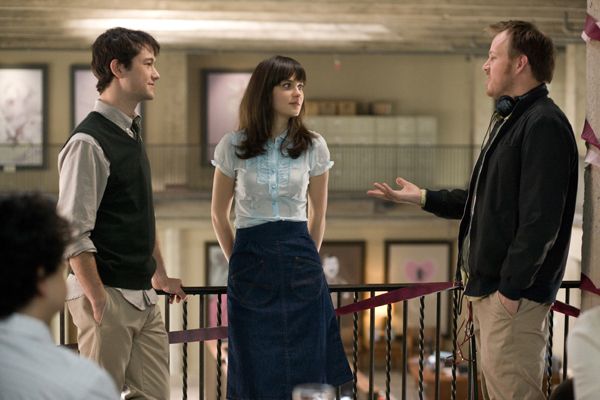
 The final product, after all the anticipation, certainly is epic, clocking in at 149 minutes, but whether or not it's a masterpiece isn't quite as certain. The film is about a group of Jewish-American soldiers who are dropped into occupied France in order to wreak havoc behind enemy lines before the rest of the Allied military makes its main assualt inland. Tarantino is a difficult director to evaluate objectively. His films are uniquely his own, despite the fact that he borrows so much from his various inspirations. This is the contradiction that is Quentin Tarantino. He is a well known lover of "genre cinema" which is a way of saying that he has spent a lot of time watching B-movies designed purposely to fit within the conventions of a specific genre, and these films directly influence his work. Some would say he outright steals from them.
The final product, after all the anticipation, certainly is epic, clocking in at 149 minutes, but whether or not it's a masterpiece isn't quite as certain. The film is about a group of Jewish-American soldiers who are dropped into occupied France in order to wreak havoc behind enemy lines before the rest of the Allied military makes its main assualt inland. Tarantino is a difficult director to evaluate objectively. His films are uniquely his own, despite the fact that he borrows so much from his various inspirations. This is the contradiction that is Quentin Tarantino. He is a well known lover of "genre cinema" which is a way of saying that he has spent a lot of time watching B-movies designed purposely to fit within the conventions of a specific genre, and these films directly influence his work. Some would say he outright steals from them.

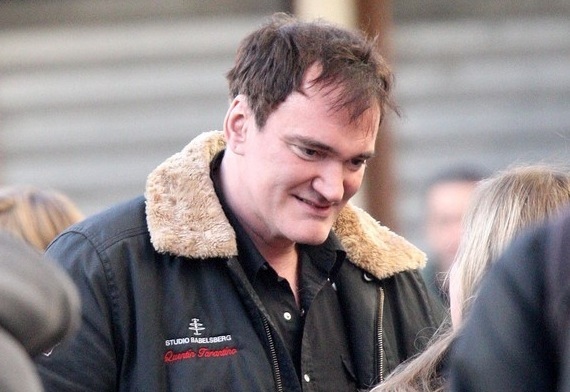 In the end, the audience has to make a simple choice. You can be continually disappointed that Tarantino will probably never make an entirely serious film without incorporating some element of parody or homage to genre cinema, or you can choose to accept him for who he is and appreciate his rare skill as a writer and his ability to show us a side of storytelling otherwise unavailable in the mainstream. It's up to you.
In the end, the audience has to make a simple choice. You can be continually disappointed that Tarantino will probably never make an entirely serious film without incorporating some element of parody or homage to genre cinema, or you can choose to accept him for who he is and appreciate his rare skill as a writer and his ability to show us a side of storytelling otherwise unavailable in the mainstream. It's up to you.

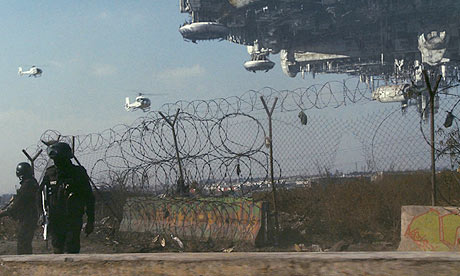 The setting of the story, South Africa, is significant in that the story seems to be an allegory of Apartheid. The aliens are given shacks for shelter and the means to survive, but they are segregated, discriminated against and exploited out of fear. But after all, they are, well... alien, and naturally don't interact well with humans. What they perceive as playful fun humans see as disruptive violence, and instead of making an effort to integrate them into society they are locked away and despised by the human majority. Under the guise of trying to help the creatures, an agency called MNU, sort for Multi-National United (whose trucks look more than a little bit like UN vehicles), are secretly trying to discover how to use alien weapon technology for their own gain, and all other ethical considerations are of no importance.
The setting of the story, South Africa, is significant in that the story seems to be an allegory of Apartheid. The aliens are given shacks for shelter and the means to survive, but they are segregated, discriminated against and exploited out of fear. But after all, they are, well... alien, and naturally don't interact well with humans. What they perceive as playful fun humans see as disruptive violence, and instead of making an effort to integrate them into society they are locked away and despised by the human majority. Under the guise of trying to help the creatures, an agency called MNU, sort for Multi-National United (whose trucks look more than a little bit like UN vehicles), are secretly trying to discover how to use alien weapon technology for their own gain, and all other ethical considerations are of no importance.
 Next up, 9, is set at some point in a post-apocalyptic future in which seemingly all humanity has been destroyed. Small creatures with numbers for names seem to be the only remaining life and they battle giant machines for their survival. It's a computer animated film produced by Tim Burton, and at least appears to be worth a look. Trailer
Next up, 9, is set at some point in a post-apocalyptic future in which seemingly all humanity has been destroyed. Small creatures with numbers for names seem to be the only remaining life and they battle giant machines for their survival. It's a computer animated film produced by Tim Burton, and at least appears to be worth a look. Trailer 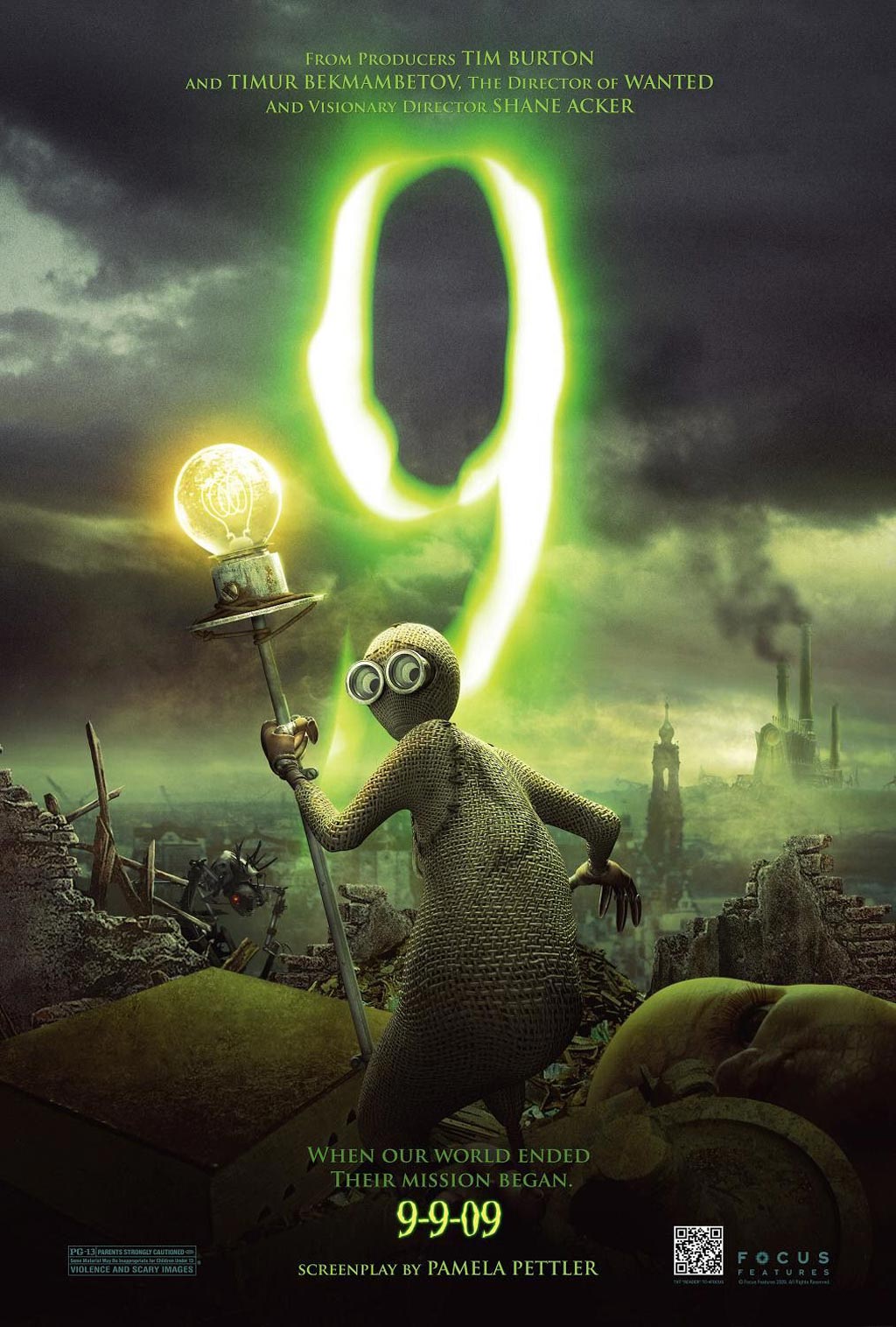 Finally, Nine, will be released just in time for awards season. It's a remake of possibly the greatest film ever made, Fellini's Italian classic 8 1/2 (1963), but this time it's being done as a musical. It's directed by Rob Marshall, who brought the Oscar winning Chicago (2002) to the big screen. It seems to star everyone in Hollywood including the amazing Daniel Day-Lewis, Marion Cotillard, Penelope Cruz, Judi Dench, Nicole Kidman, Kate Hudson, Fergie, and Sophia Loren. Personally, considering the source material, I will be most critical of this film out of the three, and from the trailer it's difficult to determine how good it will be. Trailer
Finally, Nine, will be released just in time for awards season. It's a remake of possibly the greatest film ever made, Fellini's Italian classic 8 1/2 (1963), but this time it's being done as a musical. It's directed by Rob Marshall, who brought the Oscar winning Chicago (2002) to the big screen. It seems to star everyone in Hollywood including the amazing Daniel Day-Lewis, Marion Cotillard, Penelope Cruz, Judi Dench, Nicole Kidman, Kate Hudson, Fergie, and Sophia Loren. Personally, considering the source material, I will be most critical of this film out of the three, and from the trailer it's difficult to determine how good it will be. Trailer  Only time will tell how good these three films will be, and really, other than their titles they seem to have almost nothing in common. But I felt it was worth previewing them for my loyal readers. Stay tuned for my thoughts once I see the films.
Only time will tell how good these three films will be, and really, other than their titles they seem to have almost nothing in common. But I felt it was worth previewing them for my loyal readers. Stay tuned for my thoughts once I see the films. Julie Powell, played by Amy Adams, is a young woman living in New York in 2002. She has a stressful and heart wrenching job dealing with the aftermath of 9/11 from a cubicle. She comes home every day and cooks for herself and her husband as a way of dealing with the stress. Her friends are upwardly mobile social elites moving up the ranks of the business world while she remains professionally stagnant. Julie envisions herself as a writer but she gave up on her novel, unable to maintain interest in a long term goal. What she needed was some inspiration.
Julie Powell, played by Amy Adams, is a young woman living in New York in 2002. She has a stressful and heart wrenching job dealing with the aftermath of 9/11 from a cubicle. She comes home every day and cooks for herself and her husband as a way of dealing with the stress. Her friends are upwardly mobile social elites moving up the ranks of the business world while she remains professionally stagnant. Julie envisions herself as a writer but she gave up on her novel, unable to maintain interest in a long term goal. What she needed was some inspiration.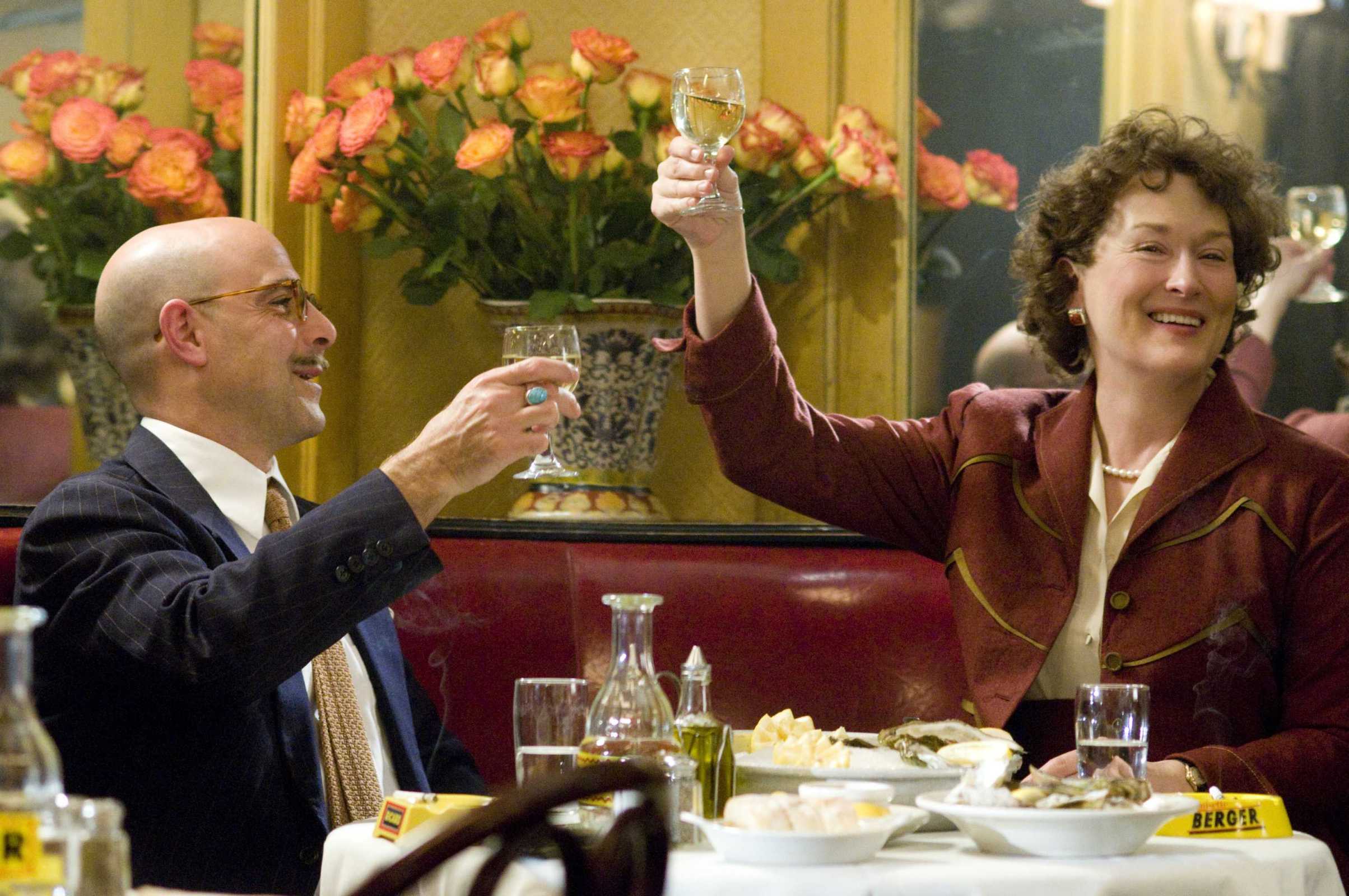

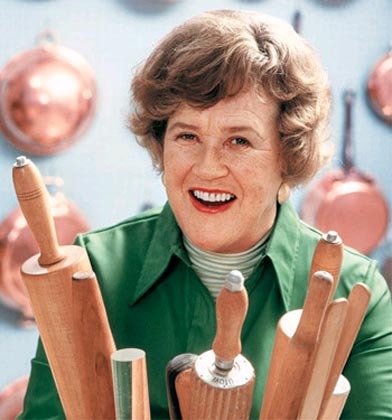
 Funny People (2009) is about one of the really lucky ones, the fictional actor and comedian George Simmons, played by real life famous actor and comedian Adam Sandler. Early in the film he learns he is dying from a rare form of cancer, and he beings to reflect on his life. He wanders through his massive house, watches his old movies on several flat panel TVs at once, and realizes that he is friendless and his life is devoid of any real meaning. He recruits a struggling stand-up comedian named Ira, played by the ubiquitous Seth Rogan, to help him write jokes and be his personal assistant. What he's really done is bought himself a friend in the same way he would have bought a new car or an expensive rug.
Funny People (2009) is about one of the really lucky ones, the fictional actor and comedian George Simmons, played by real life famous actor and comedian Adam Sandler. Early in the film he learns he is dying from a rare form of cancer, and he beings to reflect on his life. He wanders through his massive house, watches his old movies on several flat panel TVs at once, and realizes that he is friendless and his life is devoid of any real meaning. He recruits a struggling stand-up comedian named Ira, played by the ubiquitous Seth Rogan, to help him write jokes and be his personal assistant. What he's really done is bought himself a friend in the same way he would have bought a new car or an expensive rug.

 Twilight was adapted into a feature film last year, and it's soon be followed by the first of three sequels, New Moon, in November. Southern Vampire Mysteries, also known as the
Twilight was adapted into a feature film last year, and it's soon be followed by the first of three sequels, New Moon, in November. Southern Vampire Mysteries, also known as the 
